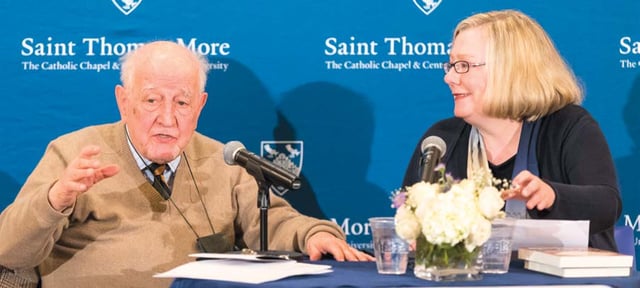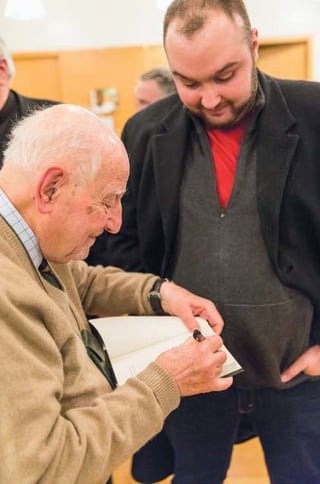
On Sunday, March 5, STM did something different for The Judge Guido Calabresi Fellowship in Religion and Law. Instead of a lecture, Cathleen Kaveny ‘90 J.D. ‘91 Ph.D., Darald and Juliet Libby Professor of Law and Theology at Boston College, sat down for a conversation with Hon. Guido Calabresi ‘53 ‘58 L.L.B., former Dean and Sterling Professor at Yale Law School and now Sterling Professor Emeritus and Professorial Lecturer in Law. The conversation was entitled “Life, Love and the Law: Continuing the Conversation” and was a follow-up to the discussion they began during their break-out session at STM’s tenth anniversary celebration in December.
Following is an excerpt from their stimulating conversation. To view the lecture in its entirety, visit stm.yale.edu/fellowships.
Cathleen Kaveny:
[Guido], you are Catholic. Your personal identity and your work identity testify to a broad tapestry of religious integration and ecumenism. Your mom’s family is Jewish, the famous Italian Finzi-Contini family; your wife, a Protestant; the university and the judicial system to which you’ve dedicated your life are broadly religiously pluralistic and include people of all faiths and no faith. Bringing together both your Catholic faith and your lived experience, how do you think about questions of religious identity and difference, and how to negotiate that in the increasingly pluralistic American public square?
Guido Calabresi:
I think everyone needs a home, a religious home, a place where they can feel comfortable and feel that they can do good. When I decided sometime between college, actually at Oxford, that I was a believer, I also decided that I needed to be part of something. I couldn’t be a person who just believed and didn’t do something regularly; [a person who goes] out to watch the sunset and pray to God. I don’t mean that people who do that, who really can do that, are any less good or anything. I didn’t trust myself to do that, so I looked for a [church] home.
Strangely, I looked for various homes. My mother had become Catholic and [Roman Catholicism] was one of them I looked at. Another one, actually the one that was almost the most appealing to me, was the Quakers, the Friends. I decided against that because I talk too much, so I couldn’t possibly be a Quaker! I found in Catholicism that which is catholic with a small “c,” and its breadth and its history and its beauty and all those things, something where I fit.
[Catholicism] is my home. I could happily accept all the beliefs. I could happily argue with all the things which one can argue with—and one can argue with a great deal because it is catholic—and found it very much my home. I must say that I can understand equally well that other people have other homes, and religion in that sense should be something which reaches out to other people and to their homes, so that you can understand what it is that makes it special for them.
I see that. I see that in my friends. I see that in any number of people whom I meet all the time, what they teach me about their home. I hope that I teach them something about what is my home. I don’t know. I think that I am totally Catholic. I should say this, though: the Jewish tradition of my mother’s family is something that is there. My mother, as she got older and older, said to me, “Guido, as I get older, I become ever more Jewish and ever more Catholic.”

CK: That’s actually very beautiful. If you think about some of what happened in the Catholic Church in the Second Vatican Council, on inter-religious relationship and particularly the relationship with the Jews, we’ve made progress. In Nostra aetate¹, from Vatican II, the council fathers decided we were no longer going to pray for the conversion of the Jews, because they were our elder siblings in the faith, and that we would be praying with them, not so much for their conversion.
GC: That’s not just them. I think, when you think of the scandal of different Christian faiths killing each other, and calling each other the most outlandish, awful names and not looking at what each of them saw that was worth seeing and doing, when one sees the same thing today with respect to different religions…How can anyone believe in Christ and not say that that is the scandal? That kind of warring over religion, that feeling of triumphalism and exclusion rather than, “I speak to everybody…”
CK: I think that that’s true. What would you like to see? We see this great expansion in the Catholic Church’s recognition of the importance of other religions traditions, and their dignity and their worth. At the same time, in the world around us, we see so much more, I guess, interreligious violence, not just abroad, but the spate of anti-Semitic activities in the United States as well as anti-Muslim activities. If you were not a second circuit judge or the dean of a law school, but say the dean of the College of Cardinals, what steps would you like to see American Catholics and Catholics around the world take to kind of combat this travesty, really?
GC: Frankly, I don’t think one can do any better than what Pope Francis is doing – doing and saying every day. I don’t know if some of you, if any of you, saw or didn’t see the thing in the New York Times the other day about giving money to panhandlers², and looking at the person and shaking the person’s hand, not worrying if the person was using the money for wine, for Crimey’s sake. The Pope in that, is saying just how much everything is a matter of human dignity, and that every person is just as worthy as anyone else – just that. If we could get that across, human dignity for every single person, we would be there – to the extent that one can use law or can use medicine or can use bananas to do it, is fine.

Guido Calabresi signs a book for Greg Pfeiffer GRD ‘17
Transcription section has been edited, annotated and condensed. The Editors would like to thank Cheryl at Rev.com for her exceptional and timely work in typing up the transcript from the original audio.
¹ Nostra Aetate: Declaration on the Relation of the Church to Non-Christian Religions, Vatican Council II, October 28, 1965.
² “The Pope on Panhandling: Give Without Worry,” The Editorial Board, The New York Times, March 3, 2017.